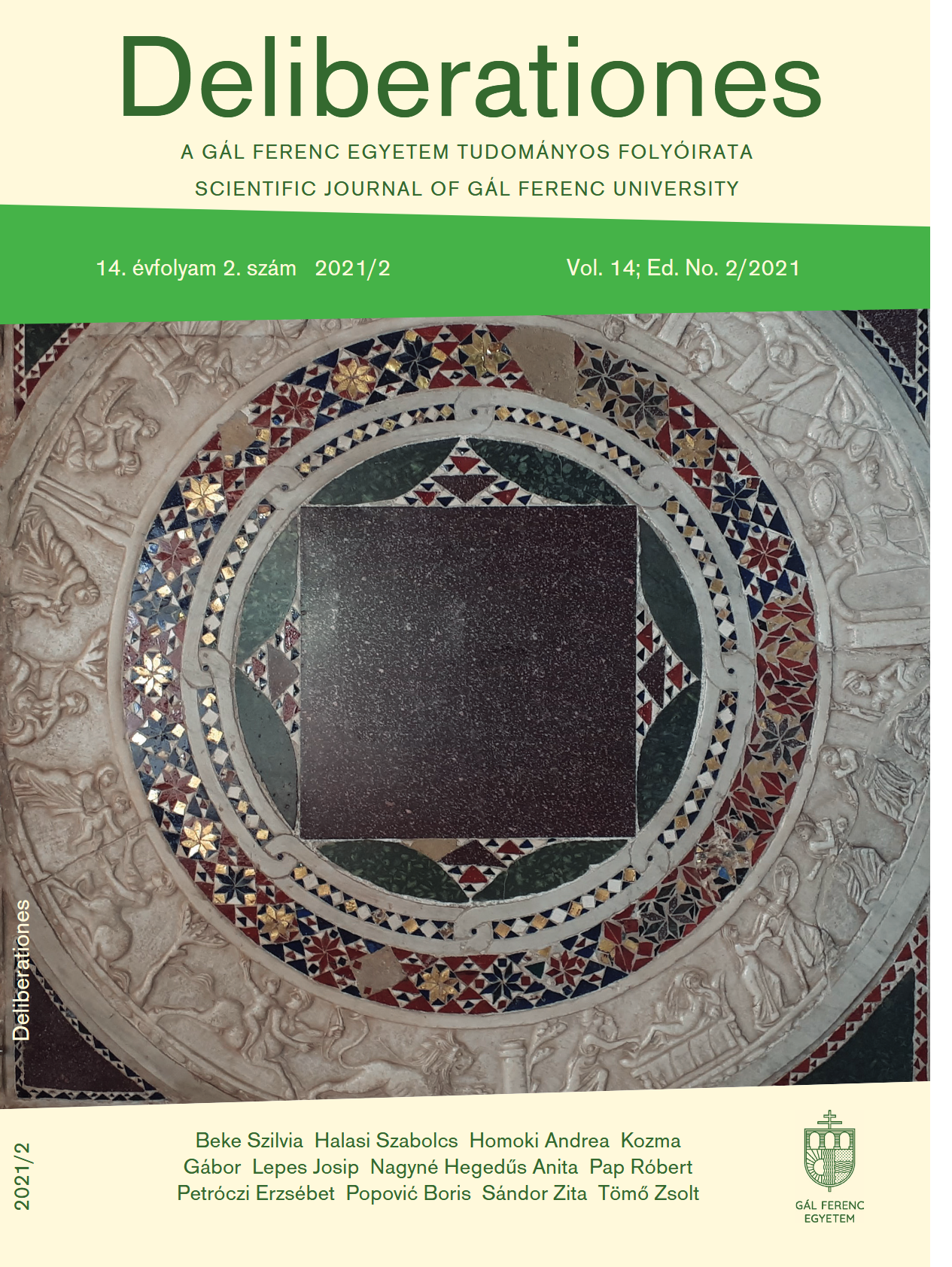Abstract
The investigation of the somatic patient’s illness beliefs and attitudes is very important because according to studies the illness representations have affects on several recovery-related processes.
The aim of the study is to present the characteristics of the illness representations and the possibilities of the exploration.Moreover the study presents two case-studies, which demonstrate the practical use of these methods.
This study draw atteintion to the importance of the examination of the illness representations of the somatic patients. As well as emphasises the importance of to education of thhis knowledge during thraining the health care and social professionals.
Keywords: illness representations, healing, drawing tests
References
Broadbent, E., Petrie, K.J., Main, J., et al. (2006). The Brief Illness Perception Questionnaire. J Psychosom Res. 60, 631–637. https://doi.org/10.1016/j.jpsychores.2005.10.020
Büchi, S., & Sensky, T. (1999). PRISM: Pictorial Representation of Illness and Self Measure. A brief nonverbal measure of illness impact and therapeutic aid in psychosomatic medicine. Psychosomatics, 40(4), 314–320. https://doi.org/10.1016/S0033-3182(99)71225-9
Büssing, A., Fischer, J. (2009) Interpretation of illness in cancer survivors is associated with health-related variables and adaptive coping styles. BMC Womens Health, 9(2).1-11. https://doi.org/10.1186/1472-6874-9-2.
Büssing, A., Ostermann, T., Neugebauer E., Heusser P. (2010). Adaptive coping strategies in patients with chronic pain conditions and their interpretation of disease. BMC Public Health, 10. 507. https://doi.org/10.1186/1471-2458-10-507.
Büssing, A., Surzykiewicz, J. (2015). Interpretation of illness in patients with chronic diseases from Poland and their associations with spirituality, life satisfaction, and escape from illness - results from a cross sectional study. Religions, 6.763-780. https://doi.org/10.3390/rel6030763
Cherrington, C.C., Moser, D.K., Lennie, T.A., Kennedy, K.W. (2004). Illness representations after acute myocardical infarction: Impact in in-hospital recovery. American Journal of Critical Care, 12(2).136-145. https://doi.org/10.4037/ajcc2004.13.2.136
Cheung, M. M. Y., Saini, B., & Smith, L. (2016) Using drawings to explore patients’ perceptions of their illness: a scoping review. Journal of Multidisciplinary Healthcare, 9, 631-646. https://doi.org/10.2147/JMDH.S120300
Csabai M & Molnár P. (2009). Orvosi pszichológia és klinikai egészségpszichológia, Medicina Kiadó. Budapest.
Dong, S.T, Butow, P.N, Tongue, A., Agar, M., Boyle, F., Forster BC, et al. (2016). Patients’ experiences and perspectives of multiple concurrent symptoms in advanced cancer: a semi-structured interview study. Supporive Care in Cancer, 24. 1373–1386. https://doi.org/10.1007/s00520-015-2913-4
Evers, A.W., Kraaimaat, F.W., van Lankveld, W., Jongen, P.J., Jacobs, J.W., Bijlsma, J.W. (2001). Beyond unfavorable thinking: the illness cognition questionnaire for chronic diseases. Journal of Consulting and Clinical Psychology, 69(6).1026-1036. https://doi.org/10.1037/0022-006X.69.6.1026
Groleau, D., Young, A., Kirmayer, L.J. (2006). The McGill Illness Narrative Interview (MINI): an interview schedule to elicit meanings and modes of reasoning related to illness experience. Transcultural Psychiatry, 43(4). 671-691. https://doi.org/10.1177/1363461506070796.
Hagger, M., Orbell, S. (2003). A meta-analytic review of the common-sense model of illness representations. Psychology & Health, 18. 141-184. https://doi.org/10.1080/088704403100081321
Juergens, M.C., Seekatz, B., Moosdorf, R.G., Pertie, K.J., Rief, W. (2009). Illness beliefs before cardiac surgery predict disability, quality of life, and depression 3 months later. Journal of Psychosomatic Research, 68(6). 553-60. https://doi.org/10.1016/j.jpsychores.2009.10.004
Kaptein, A. A., Zandstra, T, Scharloo, M., Vogel, J. J., Broadbent, E., Hughes, B. M., … van der Mey, A. G. (2011). “A time bomb ticking in my head”: drawings of inner ears by patients with vestibular schwannoma. Clinical Otolaryngology, 36183–184. https://doi.org/10.1111/j.1749-4486.2011.02264.x
Lacroix, J.M., Martin, B., Avendano, M., Goldstein, R. (1990). Symptom schemata in chronic respiratory patients. Health Psychology, 10(4). 268-273. https://doi.org/10.1037//0278-6133.10.4.268.
Látos, M., Lázár, Gy., Csabai, M. (2021). The reliability and validity of the Hungarian version of the Brief Illness Perception Questionnaire. Orvosi Hetilap, 162(6). 212–218. https://doi.org/10.1556/650.2021.31999
Leventhal, H., Meyer, D., Nerenz, D.R. (1980). The Common sense representation of illness danger. In: Rachman S, editor. Contributions to Medical Psychology. New York, New York, USA: Pergamon Press.
Lipowski, Z.J. (1983). Psychosocial reactions to physical illness. Can Med Assoc J, 128. 1069-1072.
Moss-Morris, R., Weinman, J., Petrie, K. J., Horne, R., Cameron, L. D., & Buich, D. (2002). The Revised Illness Perception Questionnaire (IPQ-R). Psychology and Health, 17(1). 1-16. https://doi.org/10.1080/08870440290001494
Petire, K. J., Jago, L. A., & Devcich, D. A. (2007). A role of illness perceptions in patients with medical conditions, Current Opinion in Psychiatry, 20, 163-167. https://doi.org/10.1097/YCO.0b013e328014a871
Sándor, Z., Csabai, M. (2018). A PRISM-D rajzteszt alkalmazása a daganatos betegséggel összefüggő érzelmi és kognitív reprezentációk komplex vizsgálatára. Orvosi Hetilap, 59(48). 2021–2030. https://doi.org/10.1556/650.2018.31181
Sándor, Z., Látos, M., Pócza-Véger, P., Havancsák, R., Csabai, M. (2020). The drawing version of the pictorial representation of illness and self measure. Psychology and Health, 17. 1-16. https://doi.org/10.1080/08870446.2019.1707825
Tiemensma, J., Daskalakis, N.P., van der Veen, E.M., Ramondt, S., Richardson, S.K., Broadbent, E., et al. (2012). Drawings reflect a new dimension of the psychological impact of long-term remission of Cushing's Syndrome. Journal of Clinical Endocrinology and Metabolism, 97(9). 3123-3131. https://doi.org/10.1210/jc.2012-1235
Tiemensma, J., Pereira, A.M., Romijn, J.A., Broadbent, E., Biermasz, N.R., Kaptein, A.A. (2015). Persistent negative illness perceptions despite long-term biochemical 1 control of acromegaly: novel application of the drawing test. European Journal of Endocrinology, 172(5). 583-593. https://doi.org/10.1530/EJE-14-0996
Tiringer, I., Varga, J., Molnár, E. (2007). Krónikus betegek ellátásának egészségpszichológiája. In. Kállai J., Varga J. Oláh A. (Szerk): Egészségpszichológia a gyakorlatban. Budapest: Medicina Könyvkiadó.
Weinman, J., Petrie, K. J., Moss-Morris R,. & Horne R. (1996). The illness perception questionnaire: a new method for assessing the cognitive representation of illness. Psychology & Health, 11(3), 431–445. https://doi.org/10.1080/08870449608400270
Zhang, Y., Fritzsche, K., Leonhart, R., Zhao, X., Zhang, L., Wei, J., et al. (2014). Dysfunctional illness perception and illness behaviour associated with high somatic symptom severity and low quality of life in general hospital outpatients in China. Journal of Psychosomic Research, 77(3). 187-195. https://doi.org/10.1016/j.jpsychores.2014.06.005
